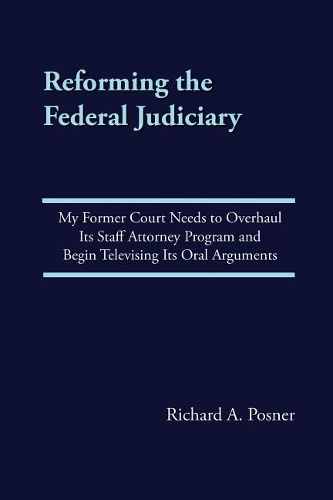
Reforming the Federal Judiciary: My Former Court Needs to Overhaul Its Staff Attorney Program and Begin Televising Its Oral Arguments
Series:
In this book Judge Posner focuses on the problems of the pro ses, the people, often prisoners, who bring lawsuits without a lawyer and the staff attorneys who review these lawsuits and make recommendations to the judges on how to decide the cases. He has done extensive research into the procedures of all thirteen circuits and compares their performance. This is the most extensive comparative revie
NaN
VOLUME
English
Paperback

In this book Judge Posner focuses on the problems of the pro ses, the people, often prisoners, who bring lawsuits without a lawyer and the staff attorneys who review these lawsuits and make recommendations to the judges on how to decide the cases. He has done extensive research into the procedures of all thirteen circuits and compares their performance. This is the most extensive comparative review of the staff attorney programs in the circuit courts that has ever been done. Judge Posner has many suggestions for improving the way these cases are handled. In addition, he discusses the need for televising the circuit court hearings. He is a believer in government transparency, and feels the public should have easy access to the workings of the courts. Finally, he reviews the duties of the circuit chief judge and recommends clarification of the position.About the Author: Richard Posner ("Dick" to his friends) was born in New York City in 1939, the only child of Max and Blanche Posner. Max was a successful lawyer and businessman, Blanche an outstanding English teacher in New York public high schools. Dick was enrolled in top-flight private schools in Manhattan, beginning in prekindergarten. After the Posners moved in Scarsdale in 1948, he was enrolled in top-flight public schools in Scarsdale and later in Bronxville. Admitted to Yale College at age 16 (skipping his fourth year of high school), Dick graduated summa cum laude and three years later graduated first in his class at Harvard Law School. Following a Supreme Court clerkship and stints in the Federal Trade Commission, the Solicitor General's Office, and a presidential commission on communications policy, Dick became a law professor first at Stanford and then a year later at the University of Chicago, where he was a full professor from his appointment in 1970 until his appointment to the Seventh Circuit Court of Appeals in 1981. He has just retired from the court after 35 years, including 7 years as the court's chief judge. In the course of his long career he has published 65 books (this book will be number 66), hundreds of articles and blog posts, and more than 3,300 judicial opinions. He has received 11 honorary degrees.
Price Comparison [India]
In This Series
Bestseller Manga
Trending NEWS




















